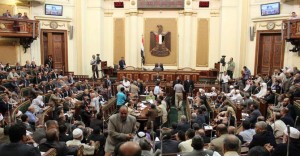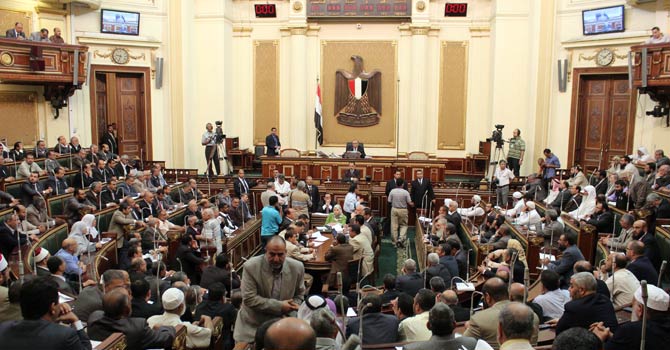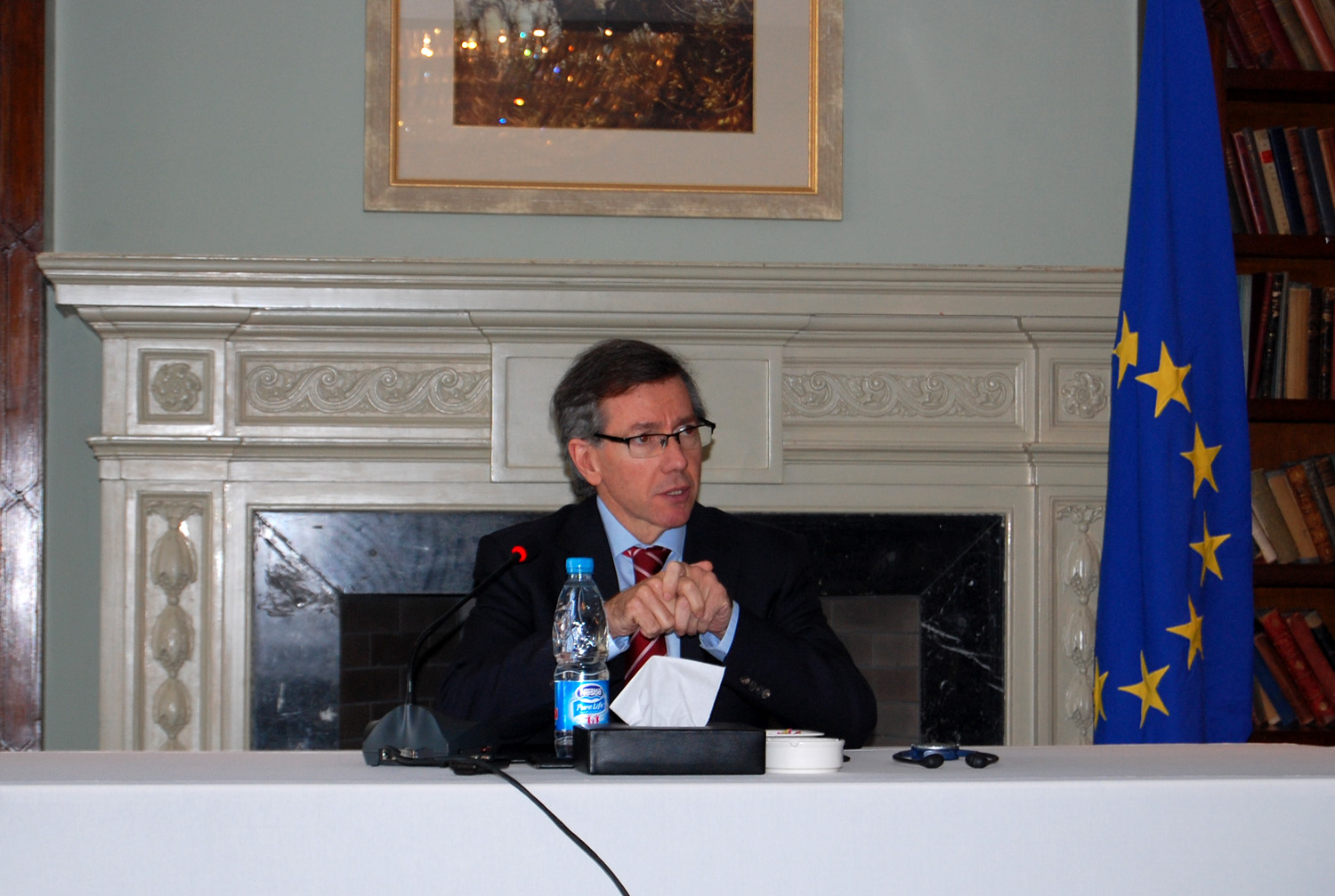
(AFP File Photo)
The upcoming parliamentary elections are the third pillar of the roadmap declared by the interim government after the ouster of the president Mohamed Morsi in July 2013.
The first two pillars, the constitutional referendum and the presidential elections, witnessed more consensus and agreements. Most political entities supported both passing the new constitution and the electing of Field Marshal Abdel Fattah Al-Sisi as president.
The once anti-Muslim Brotherhood-wide coalition that erupted after the 30 June protests has become more diversified and scattered in a number of coalitions that aim to take the majority of seats in the anticipated parliament. This comes with the absence of the political wing of the Muslim Brotherhood, the Freedom and Justice Party (FJP), along with other popular Islamist parties.
According to Article 230 of the 2014 constitution, parliamentary elections are to follow the presidential elections within six months. However, the Supreme Electoral Commission is yet to announce the exact date of these elections.
Amid the uncertain future of the elections and the coalitions’ readiness to compete, a lawsuit has been filed by lawyer Hamdy Fakharany. He demands the delaying of the elections due to security reasons and possible threats by the Brotherhood. The first trial session for the case is to take place 12 October.
The first coalition to be formed was the “Egyptian Front”, consisting of leftist, liberal parties and syndicates. The coalition includes civil parties formed during ousted president Hosni Mubarak’s rule, including leftist AlTagammu Party. Other newly established parties in the coalition include: the Conference Party; My Homeland Egypt Party led by former interior minister Ahmed Gamaleddin; Egyptian Patriotic Movement founded by Mubarak’s last prime minister and 2012 presidential candidate Ahmed Shafiq.
The cornerstone of the coalition relies on popular figures and businessmen in the political scene, who are known to have supported Mubarak, the National Democratic Party (NDP), and the armed forces. Shafiq won over 12 million votes in the 2012 elections, and is heavily backed by army supporters.
The coalition also includes the Modern Egypt party led by businessmen Nabil Diibis and AlGhad led by businessmen Mostafa Moussa. Moreover, the coalition’s spokesman Mostafa Bakry, a controversial media personality and a vocal supporter of the army, has wide support in different governorates.
Also joining the coalition are the Egyptian Trade Union Federation, the Federation of Craft Unions, and the General Union of Peasants.
The coalition highlighted its main objectives with a focus on “building a democratic national modern state with stressing the values of freedom, social justice and equality between citizens”.
“Instead of civil parties wasting the efforts and money trying to struggle on their own, the coalition is an attempt to reduce such a waste of resources,” said Hisham Hashem, deputy of the Egyptian Patriotic Movement.
Hashem added that all political entities are awaiting the elections, and that forming a parliament is the last and most important pillar of the roadmap which Al-Sisi engineered.
When asked to comment on calls to postpone the elections, Hashim said: “These voices fear the confrontation with the now outlawed Brotherhood. However, we have full confidence in our state institutions including the police apparatus and the armed forces.”
The coalition’s agenda constitutes a series of ten major points, starting with its desire for “standing against plots that aim to divide and destroy the nation”. The coalition, a strong backer of AlSisi’s government, also considers state reform, national security, and economic development as essential objectives.
AlTagammu Party attorney Alaa Essam said one of the coalition’s main aims is “to counter religious fascism and to stand as a strong civil bloc against the Muslim Brotherhood”.
Another anticipated coalition is the “Egyptian Wafad Coalition”, which will include Egypt’s oldest party Al-Wafd, lead by El-Sayyid AlBadawi. The coalition includes other parties, including the Egyptian Social Democratic Party, the Reform and Development party, and the Al-Mohafezeen Party. The main objective of the coalition is to act as a strong electoral alliance, with the political parties at the cornerstone of a democratic system.
The coalition also believes in forming a strong civilian bloc to counter political Islam and its representatives. The coalition’s aim is working from the parliament to amend and form laws that ensure democratic rule and social justice for the Egyptian people
“The presence of an alliance, which believes in the goals of the 25 January and the 30 June revolutions, will ensure that parliament will act as an observer to the government ensuring its efficiency,” according to a party statement.
Another alliance is the Democratic Alliance for Civil Forces, led by former presidential candidate and Nasserist politician Hamdeen Sabahy. A vocal opponent of the Egyptian Front alliance, Sabahy has accused them of being an attempt to bring back elements of the NDP. The alliance is to create an umbrella where revolutionary leftist and liberal political parties mobilise, including the Socialist Popular Alliance, Misr Al-Hurreya, AlTayar AlSha’aby, Al-Karamah Party, Al-Dostour Party, and the Justice Party.
Medhat AlZahar, vice president of the Socialist Popular Alliance and the Democratic Alliance, told Daily News Egypt that holding parliamentary elections before the end of the year is a crucial step to ensure that legislation is not dominated by presidential powers and not limiting the powers of the political parties.
AlSisi issued a presidential decree last June forming a Supreme Committee for Legislative Reform, which has been drafting new law decrees, and bills in compliance with Egypt’s 2014 constitution.
“The presence of the parliamentary bloc will manage to prevent the state from putting more restrictions of freedoms, especially with the ongoing fight with militant groups,” said AlZahar.
Al-Zahar added that the alliance is open to cooperating with other political coalitions as long as it does not include members of the previous regimes.
The coalition currently opposes many government policies, including the Protest Law. It has joined scores of activists in starting hunger strikes in solidarity with detainees arrested for violating the law.
Taking a more revolutionary side is the Social Justice Coalition, formed in July 2014 under the slogan of “25 January30 June”. The coalition brings together a range of opposing political figures and diverse movements, including the National Association for Change, the Nasserist Conference Party, the Egyptian Communist Party, and the Kefaya Movement. It also includes a coalition for individuals with special needs, and other women’s, labour, and farmers’ rights entities.
According to a statement by the coalition, the main focus is to “keep the principles of social justice as the most important objective upon which a better life will be guaranteed for Egyptians”. The coalition declared its direct bias for the impoverished classes and ensuring the suitable disruption of wealth and resources.
“Facing the current economic problems in the country is a crucial step along with giving a due care to developing Upper Egypt, Sinai, and impoverished districts,” the coalition said.
According to a statement on their official page, the coalition emphasised that freedom and democracy were also two important points. They explained that the revolutions the country has witnessed showed that the people are the source of all powers. “Legislation should ensure the fundamental rights and the freedom of peaceful expression as well as pluralism, and the empowerment of youth and national independence,” the statement said.
One of the coalition’s parties is the Communist Party of Egypt, established in 1975, which acts as the main opponent to the former President Anwar Sadat’s policies. It has been active in labour circles, mobilising workers in waves of strikes in recent years.
Another coalition is Tayar AlEstiqlal (Independent Current), formed to support the elected president in parliament. The coalition, led by Ahmed ElFadally, President of Al-Salam Al-Democraty Party, is composed of a number of Nasserist parties along with all the parties and entities of former members of the military.
The coalition’s objective is to form a civilian parliament, oppose the Brotherhood, and to amend the Camp David Accords to assure security in Sinai. The coalition, which plans to compete on all parliamentary seats, filed a lawsuit calling for the dissolution of all political parties founded on a religious basis. It has also called for a dissolution of all parties in the pro-Morsi Anti-Coup Alliance.
However, ElFadally said in a statement on his official page, that elections should be postponed until the Parties Affairs Committee bans all members of the Anti-Coup Alliance from running for elections.
There are still parties that remain out of these alliances, with no clear stand. These include the Salafi AlNour Party, a strong backer of the regime that yet remains a controversial entity. It has been criticised as a channel for the Brotherhood to practice politics again, and is facing the possibility of dissolution for using religious rhetoric in its political discourse.
The conservative party, which backed former president Mohamed Morsi’s ouster last year is the only Islamist entity that has expressed its intentions to run in upcoming elections.
Sayed Khalifa, AlNour’s vice president said that postponing the elections will contradict the roadmap and the 2014 constitution.
“The parliament should be a suitable finale after the constitution and the presidential elections,” he said.
As the only Islamist party in the parliamentary race, it is expected to be confronted by a civilian majority which aims to radically counter political Islam.
However, last month Al-Wasat Party announced its withdrawal from the Anti-Coup Allliance in order to form a new inclusive entity. The party emphasised the need to work outside the alliance’s framework to “establish an inclusive alliance”. This new alliance would act as an umbrella to resist the current “tyrannical rule” and to achieve the goals of the 25 January Revolution.
The alliance would depend on national cooperation between popular and revolutionary currents to go beyond all ideological and political differences, the party said.
However, experts and previous members of the Muslim Brotherhood anticipate that the party’s withdrawal is considered a manoeuvre to attract movements and parties opposing the current regime into an alliance.
Former Brotherhood member Amr Emara said the new alliance would be used to “confront the regime” on the upcoming 25 January anniversary. Any party that withdraws from the Anti-Coup Alliance, he said, would not participate in any elections as the majority of opinions are against leading government figures.
“These parties do not believe in the legitimacy of the regime,” he said. “Almost all the entities siding with the Brotherhood do not approve the concept of reconciliation.”
Nabil Naeem, former leader of the Egyptian Islamic Jihad militant group, described the party’s withdrawal as an “opportunistic move, which illustrates that the party will participate in the parliamentary elections”.
“It is expected that a number of Islamist parties, including AlWasat, AlWatan, and The Building and Development Party, will withdraw from the [Brotherhood] alliance and cooperate with the AlNour Party in a new electoral alliance,” he added.
Nevertheless, Khalifa, denied any attempts by the party to join forces with Anti-Coup Alliance elements.
“As long as these parties operate within a framework of the Anti-Coup alliance, it is impossible for us to cooperate,” Khalifa said.
Another party which publically showed its intentions to run for parliament individually is the Free Egyptians Party. Party spokesman Shehab Wagih told Daily News Egypt that proceeding to hold the elections is not only beneficial for the internal political scene, but also for the country’s international image.
“The elections will prove to the outside world that what has taken happening in Egypt since 3 July is a revolution, and not a coup,” he said.
Misr Al-Qawia (Strong Egypt Party), formed and led by former presidential candidate Abdel Moneim Aboul Fotouh, had previously announced its boycott of the constitution referendum and the presidential elections. The party’s intention whether it will participate in the new parliament is still unclear.
Mohamed ElMohandes, a spokesperson for Misr Al-Qawia expressed the party’s objection to the current elections law, saying: “The law does not enable parties to perform freely, and it gives way for to the formation of parliament controlled individuals with interests while limiting representation of the population.”
In January 2014, Egypt’s former interim president Adly Mansour passed the elections law. The law stipulates that the House of Representatives will consist of 540 elected seats. Up to 27 more seats will be appointed by the president, setting the total at 567. Of those elected seats, 420 will be voted in on an individual basis, while the remaining 120 will adhere to the party list system, increasing the individual seats up to 74% of parliamentary seats.




